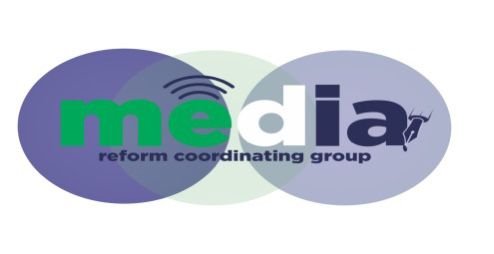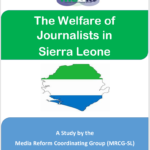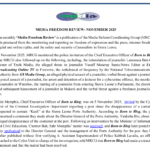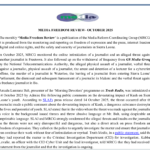Following a time of conflict, civil unrest, or repression, a set of procedures, institutions, and concerns known as “Transitional Justice” emerge with the express goal of addressing and resolving previous human rights and humanitarian law breaches. It refers to a type of justice that encompasses a variety of legal and non-legal actions taken by a community to address historical abuses and breaches of human rights and help it regain confidence and make amends.
MRCG’s Head of Programs, Augustine James on 27th November 2024 met with Sierra Leone’s Chief Minister, Dr. David Moinina Sengeh to discuss the state of transitional justice in the country. The Chief Minister told MRCG that Transitional justice is a long-term process, as government must always transition to better justice, noting that as a government, they are always looking towards to achieving a more just society. “Transitional Justice can be a transition from a state of violence or from non-democratic states to a democratic state, in other to be more progressive and more democratic and more inclusive. So, the government’s position is that we are aspiring towards more inclusive, progressive reforms, democratic values and to strengthen our democracy. That means the laws that are being reformed, the continuous engagements with citizens on deliveries, and more. We if we have focused on law reforms and strengthening the law reform commission, it means we are implementing recommendations from the TRC report, the Constitutional Review report, and other things that are old instruments,” said Dr. Sengeh.
In the subjugation of the African Union Transitional Justice Policy (AU-TJP) in Sierra Leone, Dr. Sengeh continued that the government is still very committed in doing so, and that is evident in the several laws the government has in the last five (5) years reformed, drafted and also enacted, noting that the review of the Criminal Procedure Act (CPA), the repeal of Part 5 of the Public Order Act, the Gender Equality and Women’s Empowerment Act of 2022 etc. are all forms of implementing the TRC recommendations and domesticating the AUTJP. He noted that the government has focused on accountability and decriminalizing justice, and on human rights to build trust with the younger generation of people who are on the wrong side of the law because of various conditions and that currently, the government was working on a Mediation Bill, which will be a major form of ensuring that the government implements some of these recommendations.
On reparations for war affected people in the country, he commented that most people in the country are survivors of the war so the government’s priority has been to provide those basic human rights services for everybody involved, adding that what the government has done over the years for people with amputations, war widows, etc. is that it has been providing support to their organizations to help them with a focused and inclusive approach through the NaCSA.
“As we talk about transitional justice, some members of the public society view the Tripartite Committee report as another form of the TRC report, but they are not the same because, the TRC was generic and it documented incidents of war for 11 years, while as the Tripartite report is purely between the government and the main opposition party, All Peoples Congress (APC). On our part as a government, we are very committed to the implementation of the Tripartite Committee report recommendations as they are part of our government’s commitment to the negotiation process and the implementation is also hinged on our international reputation. Many steps have already been taken so far in that regard. We don’t see these agreements as just ordinary words, but as our commitment to the people of this country,” Dr. Sengeh analyzed.
The works and engagements of Civil Society Organizations on transitional justice, have always been greatly appreciated by the government, as sometimes the government’s initiatives and agendas are driven by the positive criticisms of the CSOs, thereby helping the government to keep on the right track of its developmental strides. President Bio’s led government has expunged the death penalty from our law books, thereby projecting the country as a progressive nation. We can always have more justice, but more justice means that people have to see progress. In as much as humans like to move forward, which is a good thing to do, it’s also key to take a look backward and compare the gains we have made together as a nation as it will help give us hope to do bigger things in the future. So, we would like you all to collectively think and reflect with a focus on all the negativities in the TRC and Tripartite reports so we can help address them. Our recommendation is to do the right thing by holding the government and its operatives in a transparent and accountable manner.










Leave a Reply